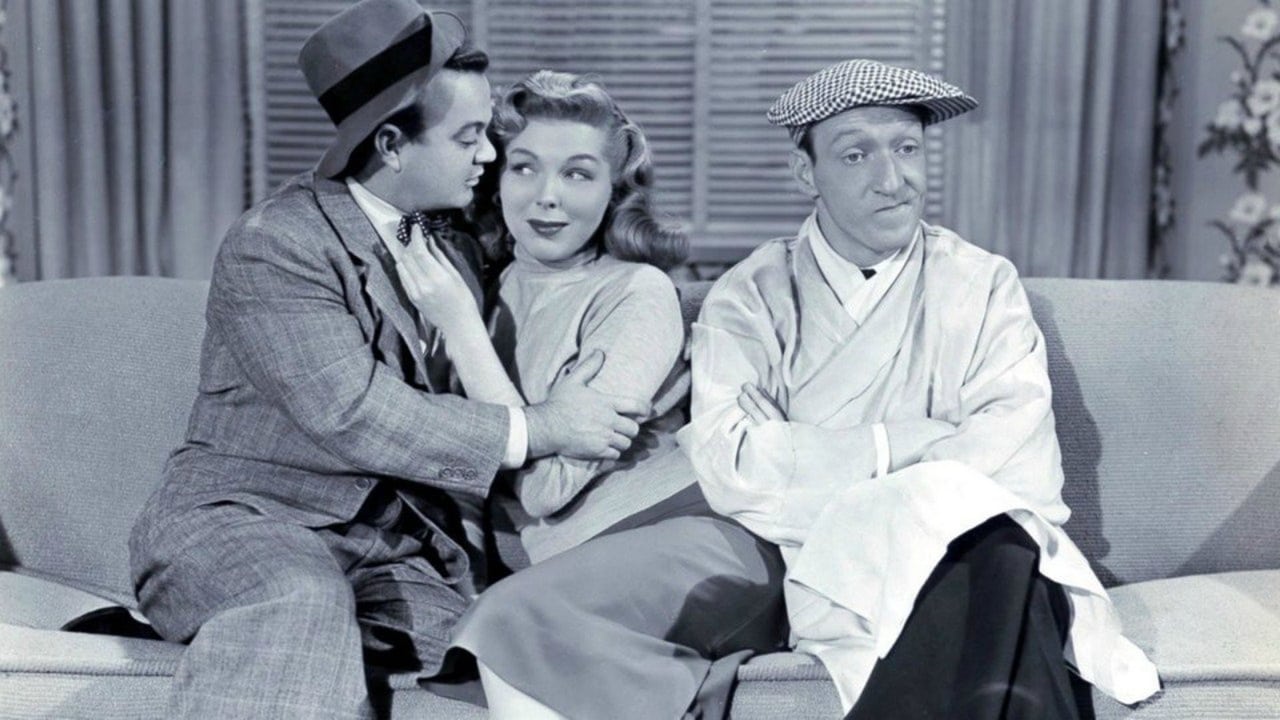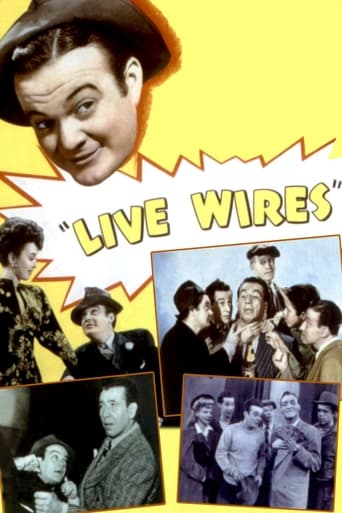

The film makes a home in your brain and the only cure is to see it again.
... View MoreIn other words,this film is a surreal ride.
... View MoreExactly the movie you think it is, but not the movie you want it to be.
... View MoreThis is a coming of age storyline that you've seen in one form or another for decades. It takes a truly unique voice to make yet another one worth watching.
... View MoreLearning that this was the first film in the Bowery Boys series explains a lot. I was mystified for example when Bernard Gorcey appeared on screen as a customer instead of the proprietor of Louie's Sweet Shop. As bookie Jack Kane, he was obviously not as likable as the character he portrayed in later pictures in the series. At the same time, Leo Gorcey's 'Slip' Mahoney also seemed like an unsavory character who couldn't hold a job because of his volatile temper and quick fisted nature. Perhaps the biggest surprise was seeing Huntz Hall as the mature member of the group, to the point of giving Slip some advice on how to hold a job and not be a disappointment to his sister Mary (Pamela Blake), who was more like a mother to him than a sister. Oh well, things would change.Otherwise, the picture does have that Bowery Boys flavor with it's cool New York City street scenes and situations calling for Slip and Sach (Hall) to get out of one scrape after another. As a fan of former pro wrestler Mike Mazurki, I never realized just how big he was until I saw him manhandle Slip from pillar to post the way he did here. I don't know if it was for real or a camera trick, but he lifted Slip and Sach off the floor with one hand in separate scenes; I don't believe I'd like to get in the guy's way for any reason.The one constant that I enjoyed in the film was Slip's malapropisms just about every time he opened his mouth. Seeing him in a tux on the way to the High Hat Club was a trip in itself, about the best he ever looked outside of a military uniform which he wore as an East Side Kid in 1942's "Let's Get Tough" or later on in 1951's "Bowery Batallion".The other cool element in the picture for me was Earle Hodgins as a snake oil salesman, a role he played with some frequency in old time Westerns of the Thirties and Forties. That he showed up in a Bowery Boys flick seemed only natural, leading me to consider that had he been born a little bit later, he might have been right at home as part of the gang.
... View MoreYou either like the Bowery Boys films with their low brow humor or you don't. I like them. They're silly, funny, and light hearted. Slip gets and loses one job after another for being too hot tempered and quick with his fists but since his sister who he lives with has a steady job he doesn't worry about it. That is, until she gets fed up and insists he get a steady job. He first thinks he's going to make a bundle as a street peddler selling Pierce's Peerless Stain Remover. In this skit, Gorcey well demonstrates how very good he was at patter. Of course, the peddler scam doesn't work out and he then gets a job at the repossession firm that Sach is working at (somewhat surprisingly Sach has a steady job). They get the assignment of finding a couple of crooks, Patsy Clark and the crook known as The Pidgeon. Slip tells the boys that in tracking down Patsy they'll first make a list of the possibilities and then "It's just a process of illumination." Slip does indeed find Patsy who turns out to be a towering, violent and menacing crook played by Mike Mazurki. There are a number of pretty funny bits in the movie but my favorite was the scene at the high class nightclub, the 'High Hat' where Slip takes his girlfriend as part of a car repo job. After hearing from Slip that "money is no objection," the snooty waiter recommends a 1928 champagne. Slip and his girlfriend are mightily annoyed and insist that the waiter bring something newer than that.
... View MoreLive Wires (1946) ** 1/2 (out of 4) The first of forty-eight films in The Bowery Boys series follows familiar grounds but in the end the film delivers enough cheap laughs to make it worth seeing. In the film 'Slip' Mahoney (Leo Gorcey) keeps getting fired from one job after another due to his short temper and willingness to throw a punch. This eventually gets under the skin of his sister who pretty much gives up on him but Slip finds work as a skip tracer and hopes that this will get him on the right path. This first film in the series could easily be mistaken for one of the East Side Kid entries as there's really not much difference. This is certainly to be expected but the one big difference here is that the budget appears to be slightly higher and the overall production seems to have stepped up a notch. The 65-minute running time begins to wear a little thin towards the end but fans of the group will probably stay entertained throughout. The opening credits read "Leo Gorcey and The Bowery Boys", which is pretty much correct as there's no doubt the film belongs to Gorcey and it's pretty clear that this was an attempt to take everything over. At least in this first entry the "gang" takes a backseat to Gorcey's one-man show. That might sound like a negative thing but Gorcey can certainly handle carrying the film and he ends up delivering a fun and fast performance. He continues the mangling of big words, which was quite familiar by this point in his career but as childish as it is I can't help but laugh at it. The hot temper stuff would seem to be growing old but he still manages to put some fire behind it and makes it fun. Huntz Hall, Mike Mazurki, Bobby Jordan, William Benedict and William Frambes bring up the support and aren't too bad even if the screenplay doesn't do them any favors. The screenplay itself is pretty familiar stuff and it never tries to be too original but it still works due to the train that is Gorcey. The highlight of the film is the sequence where Gorcey tries to get a break into the "stain removal" business.
... View MoreThe East Side Kids, knockoffs of the Dead End Kids, appeared in 21 films at Monogram Pictures from 1940-45. They became the Bowery Boys in a new series, also at Monogram, starting with LIVE WIRES (1946) and destined to last until 1958. Of the six actors who made up the original Dead End Kids, only Leo Gorcey, Huntz Hall, and Bobby Jordan appear in LIVE WIRES. (Jordan left the Bowery series in 1947 after eight films. Gabe Dell, another former Dead End/East Side Kid, joined the Bowery Boys for the fourth film in the series, but stayed only through the end of 1950.) The East Side Kids films tended to have a gritty, urban feel to them, with dramatic plots, bursts of violence, and characters who looked, sounded and behaved like they hung out on the street 24 hours a day, amidst settings built to replicate familiar slum spaces like cramped tenement apartments, basement clubhouses, alleys, storefronts, warehouses, soda counters, cheap dives, bookie joints, etc. The Bowery Boys films tended to specialize in lowbrow comedy and slapstick hijinks, often sending the Boys on not-so-exotic adventures far from the Bowery.LIVE WIRES has some comedy and familiar schtick, including Gorcey's patented mangling of big words ("why, they'll put me up on a pedestrian") and lots of slapping each other with hats, but it's much more interested in a routine crime tale that gets unnecessarily convoluted as more characters pile on. Slip Mahoney (Gorcey) has trouble holding a job and is seen failing at one thing after another (including a long, tiresome routine involving the sidewalk peddling of a phony stain remover) until he joins Sach (Hall) as a "skip tracer," basically repo men assigned to track down deadbeats and repossess merchandise that hasn't been fully paid for. It's an unlikely profession for these two and not something we'll ever see them do again. Slip does, however, prove quite efficient and, in one clever scene, manages to trick an unlucky nightclub chanteuse out of her coveted convertible. Eventually, the boys are recruited to track down and serve summonses to the ringleaders of a citywide car theft ring. This leads to a comical encounter in the film's final 15 minutes with a childlike but physically aggressive mountain-sized gangster who effortlessly (and "playfully") bounces the hapless Slip off the walls of a well-appointed lounge with a fully-stocked bar. (The gangster is played by third-billed Mike Mazurki as a take-off on Moose Malloy, the not-so-gentle giant he played in the Philip Marlowe film noir classic, MURDER, MY SWEET, 1944, a connection referenced in the ads for LIVE WIRES.) Too much of the film takes place in spacious offices, apartments, stores and a fancy club. You'd think the film actually had a budget. There's very little East Side or Bowery flavor on view. When addresses are given, they're not recognizable Manhattan addresses. (I'm sorry, but there are no "Walnut and 3rd" or "4th and Main" in Manhattan.) Slip's sister Mary (Pamela Blake), who plays the mother figure in his life, has far more screen time than any of the other Bowery Boys, aside from Sach. There's a Louie's Ice Cream Parlor, but no Louie Dumbrowsky. The actor who later played Louie, Bernard Gorcey (Leo's dad), shows up at the parlor here, but as a bookie named Jack Kane. Of the five Bowery Boys, in addition to Slip, Sach and Bobby (Jordan), there are Whitey (Billy Benedict, also a regular in the East Side Kids) and the wildly unfamiliar Homer (played by William Frambes in his only Bowery Boys movie), a farm boy who seems to have wandered off the set of one of Universal's Ma and Pa Kettle films.LIVE WIRES was the fifth film directed by Phil Karlson, who is better known for his violent, hard-hitting crime thrillers from the 1950s (KANSAS CITY CONFIDENTIAL, 99 RIVER STREET, FIVE AGAINST THE HOUSE, THE PHENIX CITY STORY, THE BROTHERS RICO) and '70s (WALKING TALL, FRAMED). He keeps things moving when he can and throws in a couple of action scenes, including a brawl started by Slip at a nightclub, but the script gives him little opportunity to craft anything particularly memorable out of this. Later films in the series would perfect the formula by placing Gorcey and Hall in center stage as a comedy team and putting them in all manner of slapstick situations and crimefighting shenanigans, sometimes keeping them at home in the Bowery and sometimes sending them off to such not-so-very-convincing locations as Paris, London, Bagdad, Las Vegas, the Wild West, the Ozarks, and assorted military bases.
... View More